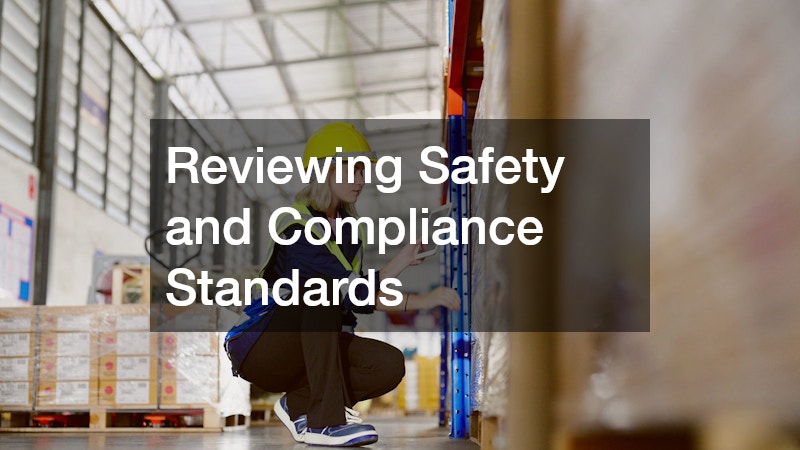For building managers, one of the most important responsibilities is keeping a property safe, functional, and attractive. Whether overseeing a residential complex, commercial office, or industrial facility, the smooth operation of the building often depends on timely repairs and preventative measures. This is where choosing the right maintenance business becomes essential. The right partner can save managers countless hours of stress by responding quickly to issues, providing expert solutions, and helping the property retain its long-term value. On the other hand, rushing into a partnership without proper consideration may lead to higher costs, more frequent breakdowns, or even safety risks.
Before making any commitments, it’s worth pausing to assess what qualities a strong maintenance business should bring to the table. Not all providers are created equal, and their services often vary based on industry experience, areas of specialization, and the types of properties they handle. Taking a structured approach to the hiring process ensures that building managers find a business aligned with their property’s needs. By defining priorities, reviewing qualifications, and considering the unique demands of the building, managers can make smarter, more confident decisions that pay off over time.
- Defining Your Maintenance Needs
- Checking Licenses and Certifications
- Reviewing Safety and Compliance Standards
- Comparing Service Packages and Costs
- Evaluating Experience in Similar Properties
- Confirming Insurance and Liability Coverage
- Asking for References and Case Studies
- Assessing Communication and Responsiveness
- Considering Technology and Reporting Tools
- Aligning Services With Long-Term Goals
- Securing Long-Term Success Through the Right Maintenance Business
Defining Your Maintenance Needs

Before reaching out to potential providers, it’s essential for building managers to have a clear understanding of what their property actually requires. Every building is unique, and maintenance needs can range from routine tasks like landscaping and plumbing to more specialized work such as electrical system inspections or HVAC upgrades. Having a detailed list of expected services helps narrow the search and prevents misunderstandings down the line. A maintenance business that knows exactly what is expected will be better equipped to deliver consistent, high-quality service. This proactive step creates a strong foundation for a productive partnership.
On a more specific level, it’s helpful to think about how the property will handle sudden or large-scale projects. For example, if the building undergoes renovations or cleanouts, managers may need a partner that understands the logistics of coordinating additional services such as construction dumpster rental. Situations like these reveal why identifying needs ahead of time is critical—because not every provider offers or manages those extra requirements. By accounting for these factors early, managers can align with a maintenance business that is both flexible and capable of handling challenges beyond routine upkeep.
Checking Licenses and Certifications
Once the property’s needs are clear, the next step is ensuring that the companies considered are properly licensed and certified. A reputable maintenance business should be able to provide proof of qualifications without hesitation. This protects building managers from liability issues, ensures that work is completed to industry standards, and demonstrates a commitment to safety. Beyond basic licenses, it is also worth considering whether the business keeps up with ongoing training or participates in professional organizations, as these are signs of long-term reliability.
For instance, a facility with energy efficiency goals may require specialized services that involve systems such as industrial insulation. Not every provider has the expertise or certifications to work with these materials safely and effectively. By asking about certifications related to particular services, managers can avoid costly mistakes and find partners that are compliant and skilled in specialized areas. In this way, carefully reviewing qualifications doesn’t just check a legal box—it ensures the maintenance business has the capabilities to meet both current and future property demands.
Reviewing Safety and Compliance Standards

Safety is among the most important factors when evaluating a potential maintenance business. Buildings must meet a range of local, state, and national regulations, and any lapses in compliance can lead to fines, legal issues, or even injuries. A responsible provider should have documented safety procedures and a history of adhering to regulatory standards. Building managers should look for businesses that take a proactive approach, regularly training their staff and updating protocols as codes evolve. Partnering with a company that prioritizes safety creates peace of mind and minimizes long-term risk for property owners and tenants.
In practical terms, the right maintenance partner will know how to integrate compliance into day-to-day operations. For example, they may have long-standing relationships with contractor supply stores, allowing them to source materials and equipment that meet code requirements. This attention to detail reflects a broader culture of accountability. By confirming that a maintenance business has a proven track record with safety, managers ensure that tenants and stakeholders benefit from a secure, well-managed property.
Comparing Service Packages and Costs
Budget considerations are always part of the decision-making process for building managers, but cost alone should not determine which maintenance business to hire. Instead, evaluating what is included in each provider’s service package is essential. Some may offer all-in-one solutions covering everything from plumbing to landscaping, while others focus on specific services. Understanding the scope of what is being offered allows managers to compare value rather than just price. Comprehensive packages may initially seem more expensive, but they can save money in the long run by reducing the need for multiple vendors.
For instance, consider a scenario where a property’s exterior aesthetics are a high priority. A company with established partnerships—such as one that regularly works with a faux stone company for building facades—may provide added value by coordinating improvements beyond basic upkeep. These kinds of services highlight the importance of comparing dollar amounts and the flexibility and expertise that come with different packages. By carefully weighing costs and services, managers can select a maintenance business that meets financial expectations while still delivering reliable, high-quality results.
Evaluating Experience in Similar Properties

Experience often sets great providers apart from average ones. A maintenance business that has worked with properties similar in size, scope, and use will already understand the unique challenges involved. This experience helps ensure the team can anticipate issues before they arise, apply proven solutions, and reduce downtime when repairs are needed. Managers should ask potential partners about past projects, the types of buildings they typically service, and whether they have testimonials or case studies demonstrating their track record. Choosing a business with relevant experience makes the partnership smoother and more dependable.
Consider an industrial property that generates waste that requires careful handling. A provider with previous exposure to processes such as metal recycling will already be familiar with local disposal regulations and efficient practices. This knowledge translates into smoother operations and avoids the learning curve that less experienced providers may face. By hiring a maintenance business that has managed similar challenges, building managers gain confidence that the property will be maintained to high standards while reducing unnecessary complications.
Confirming Insurance and Liability Coverage
Insurance and liability coverage are critical considerations when hiring a maintenance business. Building managers must ensure that any provider they work with has proper insurance to protect against accidents, property damage, or worker injuries. A reputable maintenance business should provide proof of general liability insurance and workers’ compensation without hesitation. Confirming coverage protects the property and the manager from potential financial and legal consequences, creating a layer of security essential when managing multiple aspects of a building.
For example, specific services, like tree service, can carry a higher risk due to the potential for falling branches or damage to surrounding property. If a maintenance business lacks the appropriate insurance for such high-risk tasks, the building manager could be liable for any resulting damages or injuries. Verifying insurance ensures that specialized tasks are handled safely and professionally. By thoroughly reviewing a company’s coverage, managers can confidently hire a maintenance business that safeguards staff and property while performing potentially hazardous work.
Asking for References and Case Studies

When assessing a maintenance business, references and case studies provide tangible evidence of past performance. Speaking with previous clients gives building managers insights into reliability, quality of work, and communication practices. Case studies can demonstrate how the company handled complex or unexpected situations, offering a clearer picture of their problem-solving abilities. A maintenance business with strong references signals professionalism and accountability, helping managers make informed decisions based on real-world experiences rather than marketing claims alone.
In more specific terms, water damage management requires expertise and swift response. References from clients who have faced flooding or leaks can reveal how quickly a maintenance business acted, the effectiveness of its remediation methods, and how well it coordinated follow-up repairs. These details are invaluable for building managers who want a provider capable of handling emergencies effectively. Evaluating references and case studies ensures that the chosen maintenance business can perform routine and urgent services with competence and care.
Assessing Communication and Responsiveness
Communication and responsiveness are essential qualities in a maintenance business. A property manager needs a partner who can provide timely updates, answer questions clearly, and respond quickly to service requests. Delays in communication can lead to unresolved issues, tenant dissatisfaction, and potential escalation of minor problems. Evaluating how a company communicates during the initial inquiry phase often indicates how they will perform once hired. A maintenance business that prioritizes clear and consistent communication makes collaboration easier and more efficient for managers.
Consider projects that require coordination with other contractors, such as hiring a local roofer for repairs. A maintenance business that communicates effectively can schedule work to minimize disruption, ensure that subcontractors arrive on time, and keep the manager informed of progress. This attention to responsiveness demonstrates professionalism and reliability. By assessing how well a maintenance business handles communication, building managers can avoid miscoordination and ensure that all property needs are addressed promptly and efficiently.
Considering Technology and Reporting Tools
Technology plays an increasingly important role in modern property maintenance. A maintenance business that uses advanced reporting tools, scheduling software, and real-time tracking can provide better service and greater transparency for building managers. Digital tools allow managers to monitor work progress, track completed tasks, and identify recurring issues, reducing the need for constant oversight. Choosing a provider that embraces technology ensures smoother operations, more efficient use of resources, and more informed decision-making for property management teams.
Specifically, even routine tasks like cleaning and maintaining gutters benefit from technology-driven systems. For example, maintenance software can schedule regular inspections, log service dates, and alert managers when issues are detected, helping prevent costly water damage. By selecting a maintenance business that leverages technology, managers gain a clearer view of property conditions, streamline communication, and improve overall operational efficiency. This proactive approach minimizes emergencies and enhances the value delivered by the maintenance business.
Aligning Services With Long-Term Goals
A successful partnership with a maintenance business goes beyond addressing immediate repairs. Building managers should evaluate how a potential provider aligns with the property’s long-term goals. This includes considering factors like energy efficiency, sustainability, tenant satisfaction, and property value retention. A maintenance business that shares these priorities will approach work strategically, offering solutions that support broader objectives rather than simply addressing day-to-day problems.
For instance, choosing a provider experienced with a siding contractor can improve the building’s exterior durability and aesthetic appeal over time. When long-term upgrades and preventative measures are integrated into the maintenance plan, the property experiences fewer emergencies, lower repair costs, and better tenant retention. By focusing on strategic alignment, building managers ensure that the maintenance business is a partner in sustaining the property’s condition and value over the years rather than only solving short-term issues.
Securing Long-Term Success Through the Right Maintenance Business
Hiring the right maintenance business is one of the most impactful decisions a building manager can make. A thorough evaluation process—including defining needs, verifying qualifications, reviewing safety standards, comparing packages, and checking experience—ensures that the selected provider is reliable, skilled, and capable of handling both routine and specialized tasks.
A carefully chosen maintenance business does more than fix problems—it prevents them, supports efficient operations, and adds measurable value to the property. By approaching the hiring process thoughtfully and systematically, building managers can create a collaborative relationship that benefits tenants, staff, and stakeholders alike. Investing the time upfront pays dividends in safety, cost-efficiency, and overall property performance for years to come. Choosing the right maintenance business is not a one-time task but an ongoing investment in the property’s future. A dependable provider can anticipate potential issues, implement preventative measures, and adapt to the evolving needs of the building.






